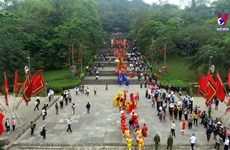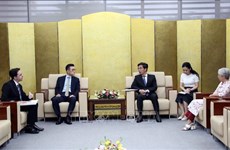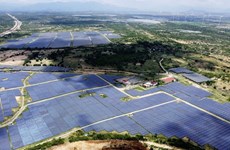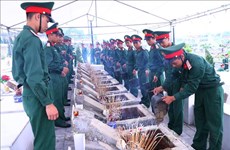Religious work reviewed in northwest
Local authorities in the northwestern region have created close links
with religious organisations and dignitaries, helping ensure fundamental
religious stability there in recent years.
Local authorities in the northwestern region have created close links
with religious organisations and dignitaries, helping ensure fundamental
religious stability there in recent years.
This was affirmed at the Steering Committee for the Northwest’s meeting on religious work, in Hanoi on May 25.
Addressing the meeting, Truong Tan Sang, Politburo member and permanent member of the Secretariat of the Communist Party of Vietnam Central Committee, stressed the northwestern region was an especially important strategic area of the country, with potential in agriculture, forestry, minerals, tourism and economic trade border gates.
“The Party and State have in recent years issued policies on socio-economic development, building the political system, ensuring security and national defence in the region in line with the spirit of the Politburo’s Resolution 37, in which special attention was given to ethnic and religion-related work,” he said.
He hailed results from the implementation of the Party’s guidelines and the State’s policies relating to religion, particularly the Central Committee Resolution 7 (tenure IX).
Sang noted key tasks for the following years, urging ministries, central and local agencies to join hands to carry out solutions and to concentrate investment in socio-economic and cultural development for the northwestern region.
The related agencies should implement cultivating and living settlement work, helping local residents stabilise and develop their production, he added.
Localities needed to focus investment on construction of essential infrastructure, such as roads, electricity network, small hydropower plants, water supply facility, communal cultural houses, classrooms, kindergartens and communal headquarters, along with carrying out policies toward poverty reduction and social security, he said.
Sang emphasised the need to build and strengthen the political system from provincial to village levels, increase human resource training, and offer incentives for young intellectuals who were ethnic minority people.
According to the Steering Committee’s report, in recent years the Party and State have issued new policies on religious work. Local committees and authorities have implemented the guidelines and developed them into programmes of actions and working plans for their localities.
Local authorities also visited and encouraged religious organisations, individuals, dignitaries and followers on the occasions of public holidays and major religious festivals, and praised outstanding organisations and individuals of local movements on labour, production and business excellence./.
This was affirmed at the Steering Committee for the Northwest’s meeting on religious work, in Hanoi on May 25.
Addressing the meeting, Truong Tan Sang, Politburo member and permanent member of the Secretariat of the Communist Party of Vietnam Central Committee, stressed the northwestern region was an especially important strategic area of the country, with potential in agriculture, forestry, minerals, tourism and economic trade border gates.
“The Party and State have in recent years issued policies on socio-economic development, building the political system, ensuring security and national defence in the region in line with the spirit of the Politburo’s Resolution 37, in which special attention was given to ethnic and religion-related work,” he said.
He hailed results from the implementation of the Party’s guidelines and the State’s policies relating to religion, particularly the Central Committee Resolution 7 (tenure IX).
Sang noted key tasks for the following years, urging ministries, central and local agencies to join hands to carry out solutions and to concentrate investment in socio-economic and cultural development for the northwestern region.
The related agencies should implement cultivating and living settlement work, helping local residents stabilise and develop their production, he added.
Localities needed to focus investment on construction of essential infrastructure, such as roads, electricity network, small hydropower plants, water supply facility, communal cultural houses, classrooms, kindergartens and communal headquarters, along with carrying out policies toward poverty reduction and social security, he said.
Sang emphasised the need to build and strengthen the political system from provincial to village levels, increase human resource training, and offer incentives for young intellectuals who were ethnic minority people.
According to the Steering Committee’s report, in recent years the Party and State have issued new policies on religious work. Local committees and authorities have implemented the guidelines and developed them into programmes of actions and working plans for their localities.
Local authorities also visited and encouraged religious organisations, individuals, dignitaries and followers on the occasions of public holidays and major religious festivals, and praised outstanding organisations and individuals of local movements on labour, production and business excellence./.













